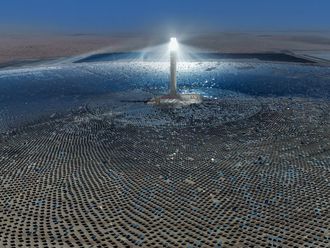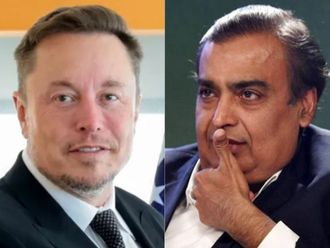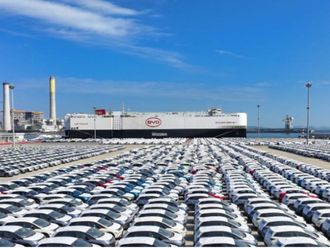Buenos Aires Argentina's seizure of YPF SA threatens to take the country further away from its goal of energy self-sufficiency as investors weigh the increased risk of expropriation in South America's second-biggest economy.
President Cristina Fernandez de Kirchner named Planning Minister Julio De Vido to head the oil company with immediate effect and is sending a bill to Congress to take a 51 per cent stake after oil imports doubled. Argentina, which wants to produce enough crude to match consumption, risks becoming "unviable" as a country because of the surge in imports, Fernandez said on Monday.
The seizure of the stake from Madrid-based Repsol YPF SA comes after more than two months of government pressure on YPF because of slumping production.
The country could double output within a decade after the discovery of shale oil fields in the south that will cost $25 billion (Dh91 billion) a year to develop and which will require YPF to find partners to help share costs.
"I don't see any upside, especially because this happened at a time when there was growing interest in the potential of unconventional resources," Daniel Kerner, an analyst at political risk research firm Eurasia Group, said on Monday in a telephone interview.
"This is going to make it very hard to attract the investment because you not only changed the rules of the game but took over the assets of the main company."
Shares plunge
Repsol plunged as much as nine per cent, the biggest drop in more than three years, and traded down 6.2 per cent at €16.40 (Dh79) in midmorning in Madrid yesterday. YPF's US-traded shares fell 11 per cent on Monday.
Repsol Chief Executive Officer Antonio Brufau said Argentina aimed to take over YPF cheaply. The expropriation is a way to cover up the social and economic crisis Argentina is suffering, he said at a press conference in Madrid yesterday.
"If Argentina thinks their resources won't decline, they are wrong," Brufau told journalists. "They will."
"It's very difficult to reverse the situation when the problem has been going on for years," Adrian Mayoral, an analyst and trader at Buenos Aires-based brokerage Mayoral Bursatil, said in a telephone interview on Monday from the Argentine capital. "The government doesn't have $20 billion every year it can dedicate to exploration and production."
The Argentine government, which in November endorsed Repsol's management of YPF, turned against the Spanish majority-owner after it announced the Vaca Muerta discovery in February because it didn't want Repsol to benefit from the bonanza, Brufau said.
"Vaca Muerta is behind this, without a doubt," he said. "We have often read that this has to belong to the state instead of being in private hands," he said, referring to local press reports quoting Argentine officials.
Fernandez replaced YPF Chief Executive Officer Sebastian Eskenazi with Planning Minister Julio De Vido and plans to send a bill to Argentina's Congress to take a 51 per cent stake in the company.
In Madrid, Spain's Industry Minister Jose Manuel Soria pledged retaliation.
"The consequences will be in the areas of diplomacy, trade, industry and energy," Soria said in an interview on state radio station RNE yesterday.
He declined to be more specific before measures are implemented and said they will be announced in the coming days.
The European Union postponed a meeting with Argentine officials scheduled for this month to weigh its response to the move, European Commission spokeswoman Pia Ahrenkilde Hansen said.
"I am seriously disappointed by yesterday's [Monday's ]announcement," European Commission President Jose Barroso told reporters in Brussels yesterday.
Commitments
"We expect the Argentine authorities to uphold their international commitments and obligations, in particular those resulting from a bilateral agreement on investments with Spain."
Argentina's oil reserves fell about 18 per cent from 1998 to 2010, according to the Argentine Oil and Gas Institute. Price caps on oil exports also made investments less attractive.
Repsol is responsible for about 54 per cent of the country's decline in reserves and production since buying YPF in 1998, according to a copy of the Argentine bill.
The company had a "predatory attitude" toward Argentina that warranted the takeover, it said.
Retaliation: Spain Vows to hit back
Spain vowed to retaliate against Argentina's exporters and energy supplies as Repsol YPF SA demanded $10.5 billion in compensation after the South American nation seized its YPF SA unit.
Repsol Chairman Antonio Brufau said yesterday he would use all legal means to win full payment for losing the oil producer. President Cristina Fernandez de Kirchner deliberately deceived investors, executives and her own people with the moves that distract voters from her country's economic problems, he said.
"They are going to lead the country into chaos," he said. Fernandez justified the takeover by blaming Repsol for insufficient investment in new oil production that's forcing the nation to import more energy. She may struggle to reverse that trend as investors said the moves deter them from buying Argentine assets. The cost to insure against an Argentine default surged the most among nations worldwide on Monday while a similar security to hedge Repsol's risk jumped to the highest since January 2009.












